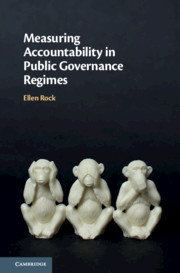Book contents
- Measuring Accountability in Public Governance Regimes
- Measuring Accountability in Public Governance Regimes
- Copyright page
- Dedication
- Contents
- Foreword
- Acknowledgements
- Table of Cases
- Table of Statutes
- Introduction
- Part I Accountability Deficits and Overloads
- Part II Benchmark of Accountability
- 3 Five Rationales for Accountability
- 4 Who Should Be Held Accountable?
- 5 To Whom Should They Be Accountable?
- 6 For What Should They Be Accountable?
- 7 How Should They Be Held Accountable?
- 8 Defining and Deploying a Benchmark of Accountability
- Part III The Complexity of Accountability Systems
- Conclusion
- Bibliography
- Index
5 - To Whom Should They Be Accountable?
from Part II - Benchmark of Accountability
Published online by Cambridge University Press: 28 September 2020
- Measuring Accountability in Public Governance Regimes
- Measuring Accountability in Public Governance Regimes
- Copyright page
- Dedication
- Contents
- Foreword
- Acknowledgements
- Table of Cases
- Table of Statutes
- Introduction
- Part I Accountability Deficits and Overloads
- Part II Benchmark of Accountability
- 3 Five Rationales for Accountability
- 4 Who Should Be Held Accountable?
- 5 To Whom Should They Be Accountable?
- 6 For What Should They Be Accountable?
- 7 How Should They Be Held Accountable?
- 8 Defining and Deploying a Benchmark of Accountability
- Part III The Complexity of Accountability Systems
- Conclusion
- Bibliography
- Index
Summary
This chapter explores two key difficulties encountered in deciding to whom an agent should be accountable for the purpose of an ideal accountability benchmark. First, there are a multiplicity of factors that might influence a prosecutor’s capacity and interest to undertake that role (eg resources, skills and motives). Secondly, we will likely reach differing views on the best choice of prosecutor depending on which accountability rationale we are interested in promoting. So, for instance, if our goal is punishment of wrongdoing we might think it appropriate that this is managed by a state prosecutor to reinforce the seriousness of a transgression. On the other hand, if our goal is to control public power we might think it appropriate to have a very open regime in order to maximise the likelihood that a prosecutor will volunteer for the task. It would be necessary to confront and resolve these difficult questions in order to define a benchmark of accountability.
Keywords
- Type
- Chapter
- Information
- Measuring Accountability in Public Governance Regimes , pp. 63 - 76Publisher: Cambridge University PressPrint publication year: 2020

